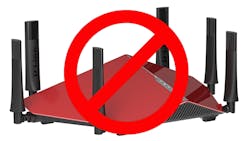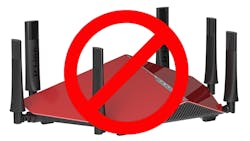The FCC is proposing a rule that could prevent intended modification of wireless devices. More specifically, it is entitled Equipment Authorization and Electronic Labeling for Wireless Devices. That link is also where you can let the FCC know about what you think by submitting a formal comment. You only have until October 9, 2015 to submit a comment, so do it soon.
A lot of people are not taking kindly to this proposed rule change, including outfits like the Free Software Foundation, the Electronic Frontier Foundation, OpenWRT, and even Qualcomm. More information can be found via Save WiFi on libreplanet.org.
For example, would you like to use open source software on something like D-Link’s DIR-890 (Fig. 1)? I might. There is a version of DD-WRT that works on it. Most users will get along fine with the software D-Link provides, but not always. Plus, there is the long-term support issue: How many have long term updates for their Wi-Fi hardware? Security fixes?
Essentially the FCC is trying to restrict how wireless devices like Wi-Fi access points and gateways, smartphones, and probably most Internet of Things-style (IoT) devices can be updated. It tends to be concerned about how these things could be used or hacked in a fashion that would make them operate outside of their approved mode of operation.
To many, the new rules would seem reasonable. They have a device and it works, so why change it? Of course, there are engineers like us who regularly install software on all sorts of things (including Wi-Fi access points) using open-source software like OpenWRT and DD-WRT.
There may also be unintended consequences, depending upon how you read the proposal. Will the limitations be restricted to devices like access points (bad enough from my viewpoint), or encompass a wider range of devices (much, much worse)?
For a more effective description of the issue take a look at Eric Raymond's response to the FCC (see "The FCC must not lock down device firmware!").
About the Author
William Wong Blog
Senior Content Director
Bill's latest articles are listed on this author page, William G. Wong.
Bill Wong covers Digital, Embedded, Systems and Software topics at Electronic Design. He writes a number of columns, including Lab Bench and alt.embedded, plus Bill's Workbench hands-on column. Bill is a Georgia Tech alumni with a B.S in Electrical Engineering and a master's degree in computer science for Rutgers, The State University of New Jersey.
He has written a dozen books and was the first Director of PC Labs at PC Magazine. He has worked in the computer and publication industry for almost 40 years and has been with Electronic Design since 2000. He helps run the Mercer Science and Engineering Fair in Mercer County, NJ.
- Check out more articles by Bill Wong on Electronic Design
- Bill Wong on Facebook
- @AltEmbedded on Twitter

